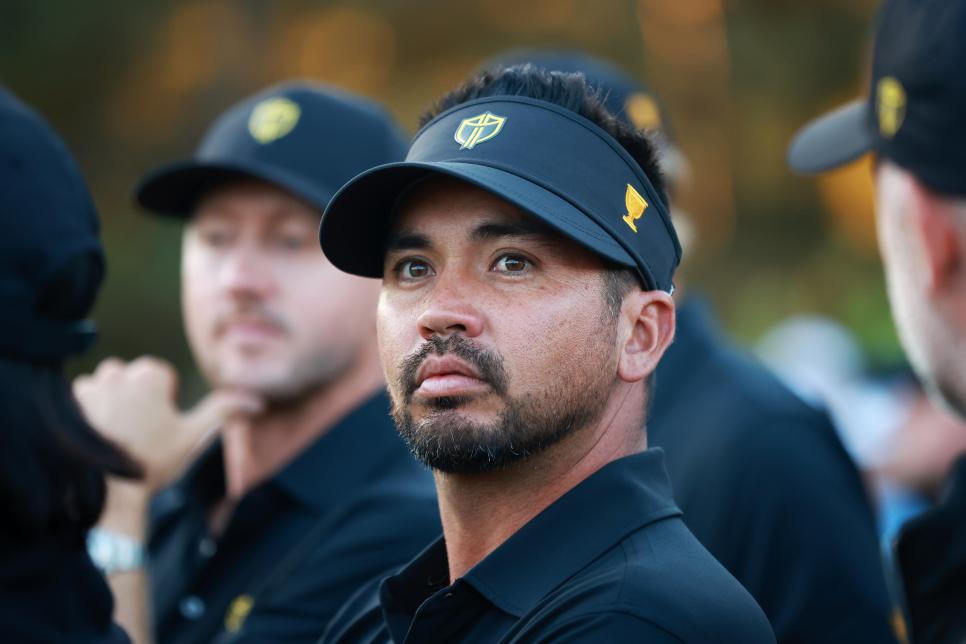I know what you’re going to say – I can hear it already: The final score was 18½-11½. The Americans were consistently placed higher in the world rankings. The Internationals were outmatched and outmuscled. Nothing that captain Mike Weir or anyone else did strategically could ever have made a difference.
This is wrong, and I’ll explain why, but first I want to you to see a critical statistic that tells a compelling story about these matches:
In five sessions, comprising 30 matches and more than 450 holes of golf, the Americans won exactly one more hole than the Internationals.
One! The final tally was 117 for the Americans, 116 for the Internationals.
And, somehow, the US still won by seven points.
Matchplay is a great equaliser, and home crowds matter quite a bit, but this is quite an anomaly. Let’s look back at Rome, where the Europeans beat the Americans 16½-11½ in the Ryder Cup; there, the Euros had a holes-won margin of plus 26. Similar score (even less of a rout), but a much more representative hole differential. At the 2022 Presidents Cup, when the US beat the Internationals 17½-12½, the American differential in holes won was plus 25. You get the idea – when you blow a team out, you expect to have a huge advantage in winning individual holes.
So what made this Presidents Cup different?
There are a few arguments. You could say that some of it is statistical noise, and that the reason the Internationals came close in holes won is that they racked up some blowout victories in Friday foursomes that distorted the final margin. To that, I would say that each component of the overall event “counts,” in the sense that the holes they won on Friday are just as valid as the holes the Americans won Thursday or Sunday. In other words, why does Friday count less than any other day? Which leads me to my theory about the seeming paradox between holes won and the final score.
This Presidents Cup was an awful lot closer than the final score made it appear. In fact, it was downright winnable for the Internationals. Some of the close losses can be attributed to random luck or superior pressure play, but a non-dismissible portion of that lopsided final margin is down to tactical errors made by Weir on Saturday.
The competition started with what can be seen as an extraordinary run of bad luck for the International team, going down 0-5 on Day 1 in matches that were all relatively close, and three of which reached the 18th hole. Remarkably, they erased that entire deficit on Friday, but unlike the American wins, three of their victories were lopsided. At 5-5 heading into Saturday, it was easy to argue by almost every statistical measure that the Internationals had been better. They also had the crowd more involved than a relatively tame Thursday – momentum was theirs.
It’s hard to quibble much with Weir’s lineup on Saturday morning. The eight players he put out were ones who had been mostly strong in strokes gained over the first two days. Getting nitpicky, the pairing of Mackenzie Hughes and Corey Conners, so good in foursomes, was pretty clearly not as good in four-ball, due to the fact that Conners has a tendency to miss putts and Hughes struggled with ball striking. Again, though, that’s a quibble, and based on how well they played together the day before, you can forgive Weir for a move that didn’t quite work out.
The problem came at the end of the four-ball session, which the US won 3-1 to retake the lead. By then, it had become clear that at least three of the players who had been effective the day before were flagging. Taylor Pendrith was particularly rough, putting up minus-5.41 strokes-gained number, but Hughes was almost as bad at minus-3.78, with Matsuyama at minus-2.59 and Conners at minus-1.10.
That’s when Weir did something very strange. For the first time in Presidents Cup history, a captain put out the same exact team, with the same exact pairings, on the same day. That had a few obvious consequences. First off, the four guys on the bench would be remaining there. Second, the eight guys on the course had already had an incredibly long day that included a fog delay. You could maybe justify a move like this if you had won the opening session by a lopsided margin, or if everyone had played well. That wasn’t the case. Again, they lost 3-1 that morning, and at least three International players had struggled mightily. It’s not like his bench was abysmal, either – he had Jason Day in reserve for one, and though the other three players (Christiaan Bezuidenhout, Ben An and Min Woo Lee) hadn’t lit up the course on Friday, their struggles were not appreciably worse than what he got from the trio that had limped to the finish Saturday morning.

Australia’s Jason Day watches on. [Image: Vaughn Ridley]
So how did that decision play out? After an even front nine, things turned terribly wrong for the International team in the last 90 minutes of the foursomes session. Of the players who struggled in the morning, Pendrith and Matsuyama were very bad again. Adam Scott dragged Pendrith to a 1-up win to avoid total disaster, but Matsuyama had nothing in the tank to hold off Scottie Scheffler and a rested Russell Henley. Conners struggled too, and he and Hughes lost when the latter made an uncharacteristically poor chip on 18, and when Cantlay and Schauffele beat Tom Kim and Si Woo Kim in the match of the weekend, the session ended 3-1 to the Americans. The overall score was 11-7 – historically, a near-insurmountable deficit in these matches. So much had been lost in such a short time.
It didn’t end there – Weir’s decision had knock-on effects for singles. First off, he now had five players who would be playing their fifth session in singles, which is correlated historically with poor results against fresher players. For the record, it’s nearly impossible to keep everyone to four matches or less – the Americans had four players who ended up playing five matches. The difference is that Furyk played his absolute best players in the first four sessions – Scheffler, Schauffele, Cantlay and Morikawa – and did so in service of securing a wide margin before singles. Weir made that bargain with players who clearly needed rest, and he had backups ready to go.
Not to mention the fact that players coming in cold, with a full day of rest, also don’t have a great record – ask Europe Ryder Cup captain Mark James, who in 1999 held out many of his players in service of establishing a 10-6 lead, then watched the cold players get trounced in singles at the American comeback in Brookline. Again, the difference is that James at least got what he wanted out of the pairs sessions, and his players delivered before the Sunday collapse.
Not so for Weir and the Internationals. It didn’t work out Saturday night – and there was evidence that it wouldn’t – and he still had to endure more expected punishment in singles, where the “tired” five-session players went 2-3, and the “cold” players went 1-1-2. Not absolutely dreadful, but not what you need when you’re already trailing by four. How much better could it have been with a little balance on Saturday?
Now, let’s give him a break. There was a legitimate talent deficit here, and a talent deficit can force you into some desperate gambits that end up looking like mistakes. Sometimes, the reality is that there was no good choice, and I can’t prove that wasn’t the case here. The fact that the Americans were 12-5-2 this weekend in matches that went to the 17th hole or beyond is not all Weir’s fault. There’s luck/variance at play, and pressure performance he can’t control, though I’d still argue that captain’s tactics can play a part in how close matches turn out. In the end, though, the evidence is clear that the minute Weir decided to repeat his Saturday morning lineups on Saturday afternoon, a winnable match spiraled out of control. Furyk played a calmer game, stuck to an established battle plan, and let the Internationals beat themselves.
We’ll never know what could have been different, of course, which is the maddening truth of team match play events. The predictable knee-jerk reaction to this post from some corners will be that I’m putting too much stock into one captain’s decisions. But I keep coming back to that nagging stat – in other blowouts, the winning team also wins far more holes. Here, it was almost dead even. The Internationals had a legitimate shot, in a way they never did in Charlotte, but a desperate tactic on Saturday night – one that always seemed doomed to fail – cost them a chance to see what might have happened. The good news is that they’re clearly narrowing the gap with the Americans. The bad news is we never got to see just how close they could have come in Montreal.

